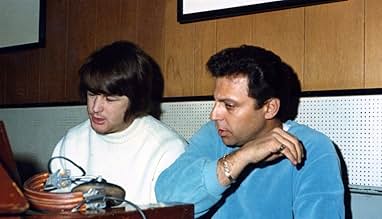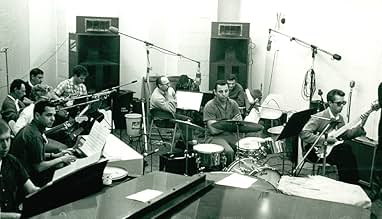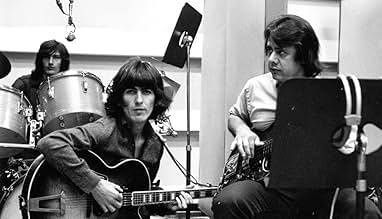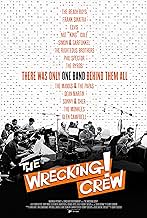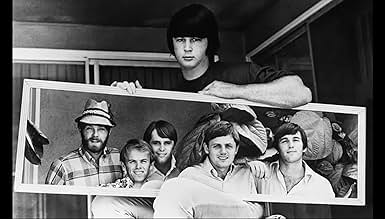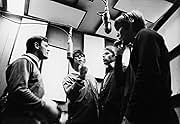Una celebración del trabajo musical de "The Wrecking Crew", músicos de sesión que acompañaron instrumentalmente a leyendas como Frank Sinatra, The Beach Boys y Bing Crosby.Una celebración del trabajo musical de "The Wrecking Crew", músicos de sesión que acompañaron instrumentalmente a leyendas como Frank Sinatra, The Beach Boys y Bing Crosby.Una celebración del trabajo musical de "The Wrecking Crew", músicos de sesión que acompañaron instrumentalmente a leyendas como Frank Sinatra, The Beach Boys y Bing Crosby.
- Premios
- 1 premio ganado y 5 nominaciones en total
Opiniones destacadas
If you have ever heard "Happy Together" by the Turtles, The Byrds "Mr. Tambourine Man", "Day Dream Believer" song by the Monkees, or "Close to You" by the Carpenters, you have heard the group of studio musicians called "The Wrecking Crew." They were regular contributors to hit songs in Los Angeles from about 1958 to 1965. The composition of the Crew varied, but if you lived in Los Angeles and needed bass, drums, guitar, horns or other instruments for your recording, you called on the in The Wrecking Crew.
According to the film, the musicians got the name "Wrecking Crew" from jazz musicians who felt they were "wrecking" music with their rock and pop stylings. Whatever they case, this group of musicians were called if you wanted to record a hit song.
The film features interviews with the players, old footage of them performing together and interviews with musical luminaries such as Cher and Brian Wilson of the Beach Boys. Wilson used The Crew for most of the backing tracks on the seminal album, "Pet Sounds." The crew could read musical scales, take direction, and write parts for the songs if needed. They were flexible and served the client first even if they talked about them behind their back after the session and on camera during the film. And as the film implies, the Crew was responsible for more than one song becoming a hit.
The footage and interviews in the film proves how important these musicians were to popular music of the late 50s and early 60s. In the 60s, bands such as the Beatles, Rolling Stones, The Doors, and so forth, left the Wrecking Crew with fewer jobs, for they had the talent to play their own instruments. Some of the musicians from the Crew, notably father of the director, guitarist Tommy Tedesco, got jobs playing for film soundtracks other records after the studio jobs dried up. Other members went on to record their own records, some even becoming big stars on their own such as Leon Russell and Glen Campbell. Yes, those stars were part of the Crew.
The film shares a unique time of music and a unique set of musicians with us. Watching the film gives us a view of the inner workings of one of the greatest groups of studio musicians in the history of popular music. And it entertains us all the way.
The set and filming is nothing scream and shout about, but the music leaves us with Good Vibrations.
Rating: Pay Full Price.
People who play or like music will enjoy by this film.
Peace, Tex Shelters
According to the film, the musicians got the name "Wrecking Crew" from jazz musicians who felt they were "wrecking" music with their rock and pop stylings. Whatever they case, this group of musicians were called if you wanted to record a hit song.
The film features interviews with the players, old footage of them performing together and interviews with musical luminaries such as Cher and Brian Wilson of the Beach Boys. Wilson used The Crew for most of the backing tracks on the seminal album, "Pet Sounds." The crew could read musical scales, take direction, and write parts for the songs if needed. They were flexible and served the client first even if they talked about them behind their back after the session and on camera during the film. And as the film implies, the Crew was responsible for more than one song becoming a hit.
The footage and interviews in the film proves how important these musicians were to popular music of the late 50s and early 60s. In the 60s, bands such as the Beatles, Rolling Stones, The Doors, and so forth, left the Wrecking Crew with fewer jobs, for they had the talent to play their own instruments. Some of the musicians from the Crew, notably father of the director, guitarist Tommy Tedesco, got jobs playing for film soundtracks other records after the studio jobs dried up. Other members went on to record their own records, some even becoming big stars on their own such as Leon Russell and Glen Campbell. Yes, those stars were part of the Crew.
The film shares a unique time of music and a unique set of musicians with us. Watching the film gives us a view of the inner workings of one of the greatest groups of studio musicians in the history of popular music. And it entertains us all the way.
The set and filming is nothing scream and shout about, but the music leaves us with Good Vibrations.
Rating: Pay Full Price.
People who play or like music will enjoy by this film.
Peace, Tex Shelters
Greetings again from the darkness. The music business has always been a bit of a mystery – not just to the average record buyer, but even to those within the industry. History is filled with singers, band members, and songwriters missing out on the pot of gold due to slick legal maneuvering from some less-than-upstanding agent, producer or label. This documentary details the prolific recordings from a core group of studio musicians responsible for the sounds heard as rock and roll music exploded on the scene
their stellar performances marketed to the public as the work of popular bands.
Lest you think this is limited to an obscure genre or style of music, the two dozen (or so) musicians known as The Wrecking Crew were responsible for the album music for such groups and performers as The Beach Boys, Frank Sinatra, The Righteous Brothers, Elvis Presley, The Mamas and the Papas, Sonny and Cher, Sam Cooke, The Byrds, and The Monkees. And we can't leave out Phil Spector's "Wall of Sound" which dominated the charts for years. Director Denny Tedesco set out to make a documentary short about his father, guitarist extraordinaire Tommy Tedesco, but quickly realized the story was much bigger than just his dad.
In addition to the very talented (and funny) Tedesco, we get interviews with such talented musicians as Hal Blaine, Earl Palmer, Don Randi, Al Casey, Pals Johnson (The Pink Panther sax soloist), Carol Kaye, and Bill Pittman. There is also insight from producers Lou Adler and Snuff Garrett, American Bandstand's Dick Clark, songwriter Jimmy Webb, plus icon Herb Alpert. Mickey Dolenz and Peter Tork explain the business rationale in having the professionals take care of the recordings, while Roger McGinnis spills the beans that other members of The Byrds (including David Crosby) were pretty miffed at the process.
The personal importance of telling this story is quite obvious in the work of the director, and is especially clear in the segments featuring his father. In addition to the popular music he was involved with, the senior Tedesco's work is heard in such well-known TV themes as Bonanza, MASH, Batman, and The Twilight Zone plus many movie scores. Archival footage is available for Q&A roundtables and some of the seminar work Tedesco did in the later stages of his career (he passed away in 1997). There is also footage of Phil Spector working in the studio, and some audio from Frank Sinatra as he works on recording, and early Brian Wilson creating the magic of Pet Sounds with the Wrecking Crew.
Glen Campbell and Leon Russell are the two big breakout performers from this group of studio musicians and both speak so highly of these unpublicized artists. Their interviews, and that of Dick Clark, highlight the confusion of timeline in the making of the film. It began making festival rounds in 2008 before running the age old issue of "musical rights" brought distribution to a screeching halt. So now, in 2015, the film is finally getting some theatre time, and with it comes the recognition and appreciation that is long overdue for the members of this very secret club few of whom seem to hold any type of grudge. They were just happy to make a living doing what they love.
This film instantly becomes one of four documentaries highly recommended for those who want to better understand the music biz. Group it with Standing in the Shadows of Motown (2002), Muscle Shoals (2013), and Oscar winner Twenty Feet from Stardom (2013) to form an 8 hour education and history of popular music over the past three generations.
**NOTE: Kent Hartman released a book entitled "The Wrecking Crew" that provides additional detail; however, it is not affiliated with Denny Tedesco's film.
Lest you think this is limited to an obscure genre or style of music, the two dozen (or so) musicians known as The Wrecking Crew were responsible for the album music for such groups and performers as The Beach Boys, Frank Sinatra, The Righteous Brothers, Elvis Presley, The Mamas and the Papas, Sonny and Cher, Sam Cooke, The Byrds, and The Monkees. And we can't leave out Phil Spector's "Wall of Sound" which dominated the charts for years. Director Denny Tedesco set out to make a documentary short about his father, guitarist extraordinaire Tommy Tedesco, but quickly realized the story was much bigger than just his dad.
In addition to the very talented (and funny) Tedesco, we get interviews with such talented musicians as Hal Blaine, Earl Palmer, Don Randi, Al Casey, Pals Johnson (The Pink Panther sax soloist), Carol Kaye, and Bill Pittman. There is also insight from producers Lou Adler and Snuff Garrett, American Bandstand's Dick Clark, songwriter Jimmy Webb, plus icon Herb Alpert. Mickey Dolenz and Peter Tork explain the business rationale in having the professionals take care of the recordings, while Roger McGinnis spills the beans that other members of The Byrds (including David Crosby) were pretty miffed at the process.
The personal importance of telling this story is quite obvious in the work of the director, and is especially clear in the segments featuring his father. In addition to the popular music he was involved with, the senior Tedesco's work is heard in such well-known TV themes as Bonanza, MASH, Batman, and The Twilight Zone plus many movie scores. Archival footage is available for Q&A roundtables and some of the seminar work Tedesco did in the later stages of his career (he passed away in 1997). There is also footage of Phil Spector working in the studio, and some audio from Frank Sinatra as he works on recording, and early Brian Wilson creating the magic of Pet Sounds with the Wrecking Crew.
Glen Campbell and Leon Russell are the two big breakout performers from this group of studio musicians and both speak so highly of these unpublicized artists. Their interviews, and that of Dick Clark, highlight the confusion of timeline in the making of the film. It began making festival rounds in 2008 before running the age old issue of "musical rights" brought distribution to a screeching halt. So now, in 2015, the film is finally getting some theatre time, and with it comes the recognition and appreciation that is long overdue for the members of this very secret club few of whom seem to hold any type of grudge. They were just happy to make a living doing what they love.
This film instantly becomes one of four documentaries highly recommended for those who want to better understand the music biz. Group it with Standing in the Shadows of Motown (2002), Muscle Shoals (2013), and Oscar winner Twenty Feet from Stardom (2013) to form an 8 hour education and history of popular music over the past three generations.
**NOTE: Kent Hartman released a book entitled "The Wrecking Crew" that provides additional detail; however, it is not affiliated with Denny Tedesco's film.
As a musician and a woman of a certain age, I nearly worship Carol Kaye as a goddess, and that led me to this film. And while I got a terrific dose of her music and storytelling, I got a lot more than that.
There is nostalgic music, funny people telling great stories, a softening of decades of wisdom to what might have one time been resentment and jealousy and so it's a thoughtful examination of the studio musicians and this moment in history. I really love what was said here about work ethic. The Wrecking Crew worked their butts off, and you don't get anywhere in an art without doing that... And even when you are the best, as they were, you still have a short shelf life.
I enjoy documentary films. While this was not a perfect one, there's so much love here in the making of the movie that I forgave the few shortcomings. And it's a crucial piece of music history.
There is nostalgic music, funny people telling great stories, a softening of decades of wisdom to what might have one time been resentment and jealousy and so it's a thoughtful examination of the studio musicians and this moment in history. I really love what was said here about work ethic. The Wrecking Crew worked their butts off, and you don't get anywhere in an art without doing that... And even when you are the best, as they were, you still have a short shelf life.
I enjoy documentary films. While this was not a perfect one, there's so much love here in the making of the movie that I forgave the few shortcomings. And it's a crucial piece of music history.
There's high chance you've never heard of them before, even though you've very likely heard what they do, but the musicians nicknamed The Wrecking Crew are without question some of the most important members of musical history thanks to their extensive collection of works from the late 50's through to the 70's.
Session artists that were like the A-Team of up for hire musicians, The Wrecking Crew were a part of so many pop culture hits and legendary pieces of music that it's highly likely one of your favourite old school songs has a member or two of the crew on it.
From The Beach Boys (whose famed album Pet Sounds was almost entirely recorded with Wrecking Crew members), Frank Sinatra, Glen Campbell (who was himself a member of the Crew before branching out into a solo career), Sonny and Cher, The Mamas and the Papas, Simon and Garfunkel and the Monkey's are but a few of the celebrated artists that members of The Wrecking Crew played with and often influenced with their extensive and skillful knowledge of music and a variety of instruments.
A labour of love for filmmaker Denny Tedesco whose father Tommy was a key member of the group with his outstanding guitar playing (a frequently used player whose tunes can be heard all over popular TV shows even e.g. Bonanza's main theme), The Wrecking Crew was filmed over a number of years and completed with help from a successful Kickstarter campaign (finished in 2008 the film was not released until last year), whose supporters wanted the world to know more about these unsung musical heroes and there's little doubting the care and effort that's been put into this production even though it at times remains a little rough around the edges and certain members don't get ample enough airplay.
This is a must watch for anyone who calls themselves music fans and an insightful look into the creation of many of the eras greatest hits plus the rise of popular music of that time. The Wrecking Crew is documentary entertainment at its most fun, un-preachy and easy to digest and should be mandatory viewing for those that grew up surrounded by these musicians works, even if they didn't know it at the time.
3 ½ Glen Campbell bowl cuts out of 5
Session artists that were like the A-Team of up for hire musicians, The Wrecking Crew were a part of so many pop culture hits and legendary pieces of music that it's highly likely one of your favourite old school songs has a member or two of the crew on it.
From The Beach Boys (whose famed album Pet Sounds was almost entirely recorded with Wrecking Crew members), Frank Sinatra, Glen Campbell (who was himself a member of the Crew before branching out into a solo career), Sonny and Cher, The Mamas and the Papas, Simon and Garfunkel and the Monkey's are but a few of the celebrated artists that members of The Wrecking Crew played with and often influenced with their extensive and skillful knowledge of music and a variety of instruments.
A labour of love for filmmaker Denny Tedesco whose father Tommy was a key member of the group with his outstanding guitar playing (a frequently used player whose tunes can be heard all over popular TV shows even e.g. Bonanza's main theme), The Wrecking Crew was filmed over a number of years and completed with help from a successful Kickstarter campaign (finished in 2008 the film was not released until last year), whose supporters wanted the world to know more about these unsung musical heroes and there's little doubting the care and effort that's been put into this production even though it at times remains a little rough around the edges and certain members don't get ample enough airplay.
This is a must watch for anyone who calls themselves music fans and an insightful look into the creation of many of the eras greatest hits plus the rise of popular music of that time. The Wrecking Crew is documentary entertainment at its most fun, un-preachy and easy to digest and should be mandatory viewing for those that grew up surrounded by these musicians works, even if they didn't know it at the time.
3 ½ Glen Campbell bowl cuts out of 5
First-rate documentary on the evolving group of Los Angeles session musicians self-dubbed The Wrecking Crew who, throughout the 1960s and early '70s, performed mostly without credit on many of the greatest songs in music history. Directed by Denny Tedesco, whose father Tommy was a guitarist in the Crew, this lively, lovely document of the music scene in southern California during rock and roll's heyday is alive with memories and awash in marvelous tunes. Candid interviews with Tommy Tedesco (before his passing), Glen Campbell and Leon Russell (both onetime members of the Crew), drummer Hal Blaine, saxophonist Plas Johnson, bassist Carol Kaye, keyboardist Don Randi, and artists such as Brian Wilson, Cher, Nancy Sinatra, Mickey Dolenz and Peter Tork, Herb Alpert and producer Lou Adler add to the rich experience. A highly entertaining way to get acquainted with these talented musicians, whose music one instantly recognizes yet whose names and faces have heretofore remained anonymous. ***1/2 from ****
¿Sabías que…?
- TriviaAlthough completed in 2008, the film wasn't released until 2015. The reason for the gap was problems with music licensing rights. It took a Kickstarter campaign to raise the $200,000 to clear them.
- ErroresA brief live clip of Jan & Dean performing "Surf City" is misattributed to The Beach Boys.
- Citas
Hal Blaine: [last line of Movie] What do you call a trombone player with a beeper?
Hal Blaine: An optimist.
- ConexionesFeatures The Adventures of Ozzie and Harriet (1952)
- Bandas sonorasGood Vibrations
Written by Brian Wilson and Mike Love
Performed by The Beach Boys
Courtesy of Capitol Records
Under License from EMI Film & Television Music
Dedicated by David Ehrlich
Selecciones populares
Inicia sesión para calificar y agrega a la lista de videos para obtener recomendaciones personalizadas
- How long is The Wrecking Crew!?Con tecnología de Alexa
Detalles
- Fecha de lanzamiento
- País de origen
- Sitios oficiales
- Idioma
- También se conoce como
- レッキング・クルー 伝説のミュージシャンたち
- Locaciones de filmación
- Palm Springs, California, Estados Unidos(Hal Blaine interview)
- Productora
- Ver más créditos de la compañía en IMDbPro
Taquilla
- Total en EE. UU. y Canadá
- USD 801,606
- Fin de semana de estreno en EE. UU. y Canadá
- USD 56,858
- 15 mar 2015
- Total a nivel mundial
- USD 801,606
- Tiempo de ejecución
- 1h 41min(101 min)
- Color
- Relación de aspecto
- 1.78 : 1
Contribuir a esta página
Sugiere una edición o agrega el contenido que falta




